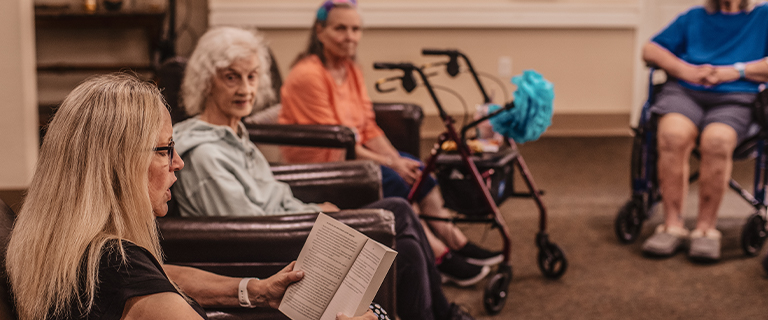Hip fractures are one of the most serious health challenges older adults face. While the physical effects are widely recognized, hip fractures can contribute to cognitive decline due to prolonged immobility, social isolation, and increased risk of delirium during recovery. These factors can exacerbate memory issues and impair overall brain health.
At Parsons House Preston Hollow, we’ve seen how comprehensive care during recovery can significantly improve both physical healing and cognitive well-being. By understanding this connection, families can take proactive steps to support their loved ones through recovery and consider whether other options, such as memory care, may be needed to help manage the effects of cognitive changes.
What Is the Link Between Hip Fractures & Cognitive Decline?
Research shows that hip fractures can trigger both immediate and long-term cognitive changes in older adults. The trauma of a fracture, combined with surgery, anesthesia, pain medications, and extended immobility, can create a perfect storm that affects brain function. This connection exists on multiple levels, from the acute stress response to longer-term changes in daily functioning and independence.
The relationship works both ways: existing cognitive impairment increases fracture risk, while fractures can accelerate cognitive decline. This creates a challenging cycle that requires careful attention and intervention from healthcare teams and families.
Why Are Hip Fractures Prevalent in Older Adults?
Hip fractures occur frequently in older adults due to several age-related factors. Bone density naturally decreases with age, making bones more fragile and prone to breaking from minor falls. Additionally, balance issues, medication side effects, vision changes, and muscle weakness all contribute to increased fall risk.
Understanding these risk factors helps communities like ours implement preventive measures, from fall-proofing living spaces to providing balance exercise classes that help maintain strength and balance.
Immediate Post-Fracture Cognitive Decline
Experiencing a fracture can have unexpected impacts beyond physical recovery, particularly on cognitive health. Research suggests that older adults may face an increased risk of cognitive decline shortly after suffering a fracture, highlighting the need for comprehensive care and support.
Temporary Impairment
Many older adults experience cognitive changes following a hip fracture. These can include confusion, difficulty concentrating, memory problems, and disorientation. These symptoms often appear suddenly and can be distressing for both patients and families.
Contributing Factors
Several factors contribute to cognitive changes after hip fractures. Anesthesia from surgery can cause temporary confusion, especially in older adults. Pain medications, while necessary, can affect mental clarity. The stress of hospitalization, disrupted sleep patterns, and sudden changes in environment all compound these effects.
Dehydration, infections, and the body’s inflammatory response to injury can also play significant roles in acute cognitive changes. Recognition of these factors allows medical teams to minimize their impact through careful monitoring and intervention.
How Does a Hip Fracture Lead to Long-Term Cognitive Decline?
Hip fractures can have a lasting impact on cognitive health, with several factors contributing to long-term decline during recovery. Here are the key mechanisms behind this connection:
- Reduced Physical Activity: Prolonged inactivity during recovery can harm brain health, as regular exercise is vital for maintaining cognitive function.
- Social Isolation: Limited social interaction during recovery can negatively impact brain health, as meaningful connections are crucial for cognitive well-being.
- Psychological Effects: Loss of independence and mobility often leads to depression and anxiety, both linked to cognitive decline.
- Chronic Pain & Mobility Issues: Persistent pain or ongoing mobility challenges can lower a person’s quality of life and further affect cognitive health.
Addressing these challenges early can help mitigate cognitive decline and improve overall recovery outcomes for individuals with hip fractures.
What Increases the Risk of Cognitive Decline?
Cognitive decline can be influenced by a variety of factors, some of which may surprise you. Understanding these risk factors is an essential step in protecting brain health and maintaining quality of life.
Dementia & Alzheimer’s
- Individuals with dementia or cognitive impairment face higher risks of further decline after hip fractures.
- The stress of injury and recovery can speed up the progression of these conditions, highlighting the need for early intervention and specialized care.
Accelerated Decline
- Older adults with hip fractures experience faster cognitive decline than those without fractures.
- This decline can occur even in individuals with normal cognitive function before their injury.
Factors Influencing Risk
- Advanced age, pre-existing cognitive impairment, multiple medical conditions, poor nutrition, and limited social support increase the risk of cognitive decline after a hip fracture.
- Complications during recovery, such as infections or prolonged immobility, can further worsen outcomes.
Steps to Prevent Cognitive Decline After a Hip Fracture

Recovering while maintaining both physical and cognitive health requires a well-rounded approach. Here are a few key strategies to support overall well-being during this time:
- Early Mobilization: When medically appropriate, staying active helps preserve physical and cognitive function.
- Cognitive Activities: Engage in activities like reading, puzzles, or conversations to keep the brain stimulated.
- Social Connections: Stay connected with family and friends through visits or group activities to prevent isolation.
- Proper Nutrition: A balanced diet is essential for both physical healing and brain health.
- Pain Management: Work with healthcare providers to manage pain effectively while maintaining mental clarity.
- Therapies: Physical and occupational therapy aid recovery and support cognitive function with structured, goal-driven activities.
The connection between hip fractures and cognitive decline underscores the importance of comprehensive, compassionate care during recovery. While this relationship presents real challenges, understanding these risks allows families and caregivers to take proactive steps that can make a meaningful difference.
At Parsons House Preston Hollow, we understand the importance of addressing both recovery and long-term cognitive health. Contact us today to learn how our dedicated team provides personal care and clinical insight to support every step of your journey.



